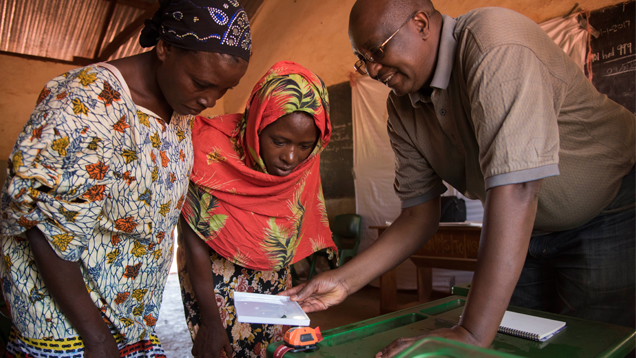GIA Develops Free Gem Guide for Artisanal Miners

Institute works with NGO Pact and women’s mining group in Tanzania for pilot study
CARLSBAD, Calif. – April 4, 2017 – GIA (Gemological Institute of America), working with nonprofit international development organization Pact, recently launched a pilot study to test a new rough gem guide. The guide was developed specifically to offer basic gemological and market knowledge for artisanal miners in gem-producing regions. The illustrated booklet, available in English and Tanzanian Swahili, was distributed to approximately 45 women miners in the Tanga region of Tanzania.
“This project is at the very core of GIA’s mission,” said GIA President and CEO Susan Jacques. “We are moving practical gemstone education as far up the supply chain as possible, to people who can benefit tremendously from greater understanding of the beautiful gems they bring to market.”
The content and form of the booklet, Selecting Gem Rough: A Guide for Artisanal Miners, was developed by a team of GIA gemology, market, education and design staff working in consultation with colored gemstone experts who have extensive experience buying gems in rural areas. The project, originally conceived by GIA Distinguished Research Fellow Dr. James Shigley, is part of the Institute’s mission-driven effort to share gem information and related skills throughout the gem and jewelry industry supply chain and with the public.
All costs for the pilot – approximately $120,000 – were paid from the GIA endowment fund. GIA provided the booklet and training at no cost; the booklet will remain free of charge as the Institute expands the training to other small scale rural miners in East Africa later this year.
A seven-person GIA and Pact team traveled to the Tanga region of Tanzania in January 2017 to conduct training with the booklet for approximately 45 women miners of the Tanzanian Association of Women Miners (TAWOMA). “Because the booklet is very visual with explanations in Tanzanian Swahili, the miners immediately recognized the practical applications and how they can benefit from this easy-to-use information,” said Robert Weldon, GIA manager of photography and visual communications, who helped develop and test the booklet. “It was incredibly fulfilling to see how sharing GIA’s extensive gem knowledge could directly impact the daily lives of artisanal miners.”
Pact, a Washington D.C.-based international development nonprofit, has worked with diverse artisanal and small-scale mining communities throughout Africa for more than 15 years. "There is often a knowledge differential between artisanal miners and those further along the supply chain,” said Cristina Villegas, technical program manager for Pact’s Mines to Markets program. “This new GIA resource will help miners in rural areas better understand the quality and value of their products, which will help reduce that differential and improve their economic development opportunities."
The Tanga region was chosen for the pilot because of its diversity of gemstones and the expressed interest of TAWOMA leadership.
Nearly every gem species mined in East Africa is described in the durable, waterproof booklet that includes illustrations of rough and polished gems. There are also graphical instructions on how to prepare and examine rough under a variety of lighting conditions using an included translucent tray.
.jpg)


